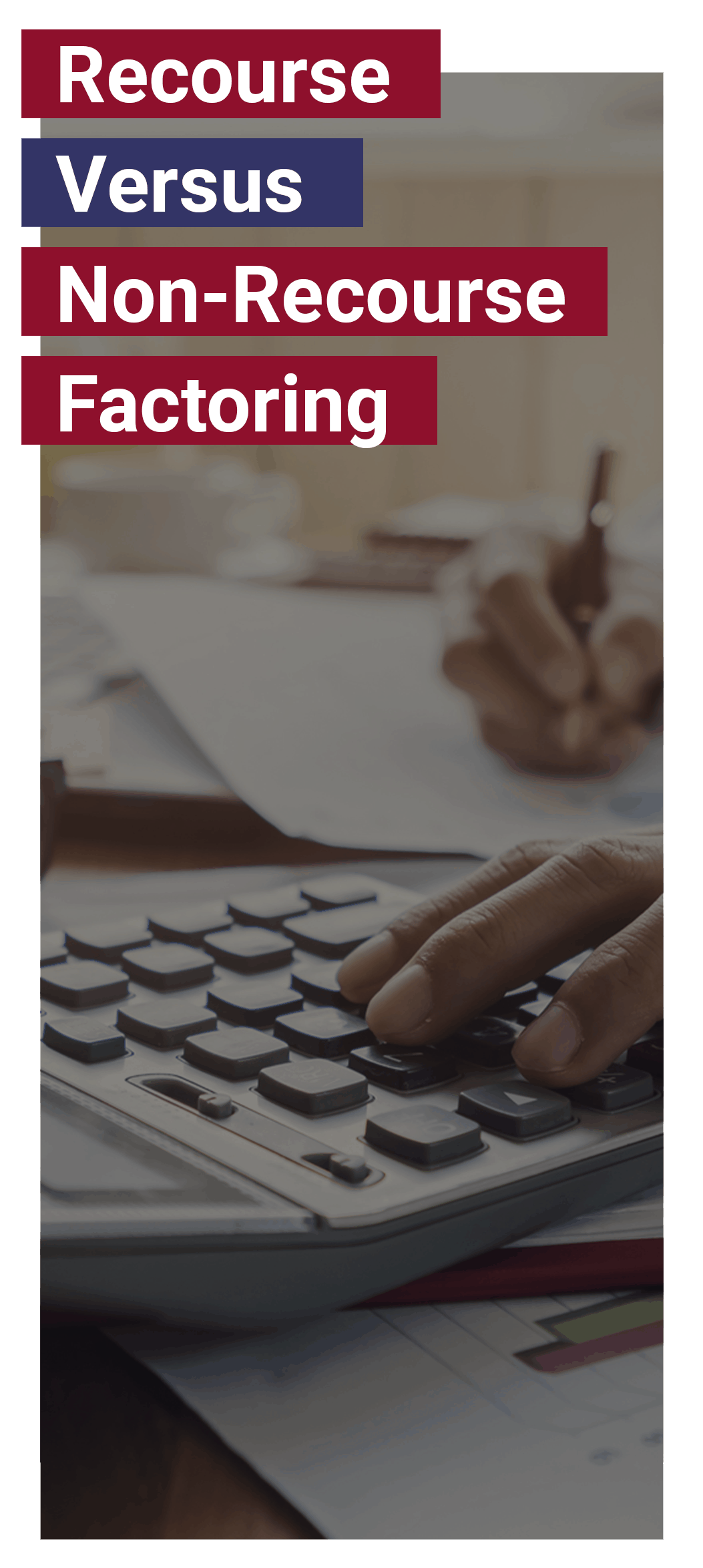Accounts Receivable Factoring: Recourse vs. Non-Recourse Factoring
Factoring is when a company sells its accounts receivable to another company in exchange for cash in advance of the accounts receivable payment due date. The company pledges its rights to collect its accounts receivable to the Factor in exchange for a cash advance. Companies decide to factor their accounts receivable for several reasons. Some companies are looking for cash to pay pressing financial obligations, especially when facing an unexpected increase in sales or when accounts payable become due faster than the terms of payment under the accounts receivable.
How Factoring Works

1. You submit an invoice/progress payment on work that has been completed

2. The invoice is verified with your client

3. The lender provides immediate funding

4. Your client remits payment within their payment terms which is usually 30 to 60 days

5. The lender issues a rebate for the remaining reserve balance, less the factoring fee
Companies also choose to factor when their customers require extended payment terms. By not providing extended payment terms, a contract, sale or customer relationship can be lost. Other companies choose to focus on their business’ day to day operations and prefer to outsource their accounts receivable department.
Factors can help your business deal with customers with poor payment histories due to their experience in collecting receivables. A good factoring company can help you make significant reductions in your losses due to non-payment by assisting you in analyzing the credit of your customers before you enter into a contract, accept a purchase order, start the work, or deliver goods.

Two Ways to Factor
Factoring can either be recourse or non-recourse. While both provide consistent cash flow, it is important to know the difference between the two before making a decision on how to fund your company’s working capital needs.
Recourse Factoring
A company that factors with recourse is one that works with a Factor that lends against the accounts receivable using them as collateral to advance funds. Typically recourse factoring requires the personal guarantee of management or the owners because the owners must maintain liquidity to purchase back any non-performing accounts receivable taken as collateral by the Factor. The company is still ultimately liable for the invoices if they remain unpaid past their due date. Any invoice that is non-collectible or in dispute is sold back to the company. Recourse Factors can offer higher advances and lower factor fees when purchasing the invoices under recourse factoring facilities.
Non-Recourse Factoring
A Factor that executes an invoice purchase agreement with a company without asking the company to repurchase unpaid or past due accounts receivable is automatically non-recourse. In a non-recourse arrangement, the Factor assumes the credit risk and liability of non-payment on a factored invoice. Non-Recourse Factors are often compensated differently for taking the credit risk away from the company. Advance rates may be lower and factor fees may be higher when compared to recourse factoring. Since the Factor is taking on more risk in a non-recourse transaction, to qualify the company’s customer, they must have an extensive history of prompt on-time payments and meet the credit requirements of the Factor.
Non-recourse factoring is the best choice if you are risk-averse. However, it is important to know that not all factoring companies purchase accounts receivable on a non-recourse basis.
Recourse Factoring
-
The most common type of factoring
-
More flexible credit requirements
-
Lower fees
-
More flexibility on advance rate
-
You are responsible for failed customer payments
-
Multi-year contracts required
-
Minimum volume commitment
-
Personal guarantee requirement
Non-Recourse Factoring
-
Less common
-
Factor assumes the risk of non-payment
-
Slightly higher fees
-
More stringent credit requirements
-
Advance rate is generally lower than a recourse transaction
-
No long-term contract
-
No minimum volumes
-
No personal guarantee
Understanding the Terms
When looking for a factoring company, it is important to research several competent factoring firms and compare their terms. This is an important step to take regardless of whether you are looking for recourse or non-recourse factoring. Consider working with a factor that provides both types of factoring. Some of your clients may make better candidates for recourse factoring than others.
Factors with a competent credit team can help your business deal with customers with poor payment histories. A good factoring company can help you make significant reductions in your losses due to non-payment by assisting you in analyzing the credit of your customers before you start the work or deliver goods.
How to Use Factoring for Cash Flow
Recourse Factoring involves pledging a company’s invoices in exchange for an immediate cash advance. Any non-performing accounts receivable must be paid off by the company or the owners should the factor request payment of the non-performing accounts. Nearly all factors are recourse to avoid the risk of unpaid accounts. Recourse factoring has several advantages for lenders. Lenders in this arrangement face minimal risks. The factor does not have to deal with risks of non-performing accounts receivable.
Many lenders find recourse factoring more advantageous because the owners have provided them with a guarantee of payment when accounts receivable becomes non-performing. On the other hand, the borrower faces greater risks because they are responsible for all uncollected payments.
Clients often find non-recourse factoring beneficial. However, this type of factoring requires the factoring company to absorb all the debts or uncollected invoices. It is less risky for management because if they provide the service properly or deliver the product as agreed they do not have to repay the factor for non-performing accounts receivable like they would under a recourse factoring agreement.
Which Type of Factoring is Suitable for my Business?
There are advantages and disadvantages of both recourse and non-recourse factoring. In general, companies with creditworthy customers and strong balance sheets face less risk regardless of whether they choose recourse or non-recourse factoring. Every business is unique as far as dealing with collecting from customers. It is important to consider the benefits and drawbacks of both recourse and non-recourse when factoring your invoices to decide which will better meet your business needs.


